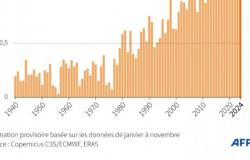In an opinion published Thursday, the National Agency for Food, Environmental and Occupational Health Safety recommends a “ systematic enrichment of the diet with folic acid » white and wholemeal flours to improve vitamin B9 intake.
Because insufficient intakes of vitamin B9 in pregnant women constitute one of the main risk factors for neural tube defects (NFTN), congenital malformations which can have very serious consequences on the development of the brain and the spinal cord of the newborn.
A WHO resolution encourages States to enrich foods with vitamin B9 – most often flours, sometimes bread or cereal products – in order to prevent these malformations, a recommendation adopted by more than 80 countries in recent years.
Address social inequalities
In France, a prescription for folate is currently recommended for women wishing to become mothers: it must in principle begin at least eight weeks before conception and continue during the first trimester of pregnancy.
However, according to the 2021 National Perinatal Survey, less than a third of women report having started vitamin B9 supplementation before their pregnancy, as recommended.
https://www.whatsupdoc-lemag.fr/video/la-consult-de-lucie-joly-si-comprend-mieux-ce-quil-se-passe-dans-la-tete-dune-femme-enceinte
« A proportion that deteriorates with social inequalities: studies show that the younger the mothers are and the lower their level of education, the less they declare having started taking vitamin B9 before their pregnancy », notes ANSES.
« Wheat flour was chosen as the food to be enriched for two reasons: it is an ingredient used in many commonly consumed products (breads, biscuits, etc.) and these products are economically accessible to everyone. women targeted », declared Vincent Bitane, scientific coordinator of the Anses expertise, quoted in the press release.
Folate in its natural state is mainly found in green vegetables, citrus fruits, eggs and cheeses.
With AFP






